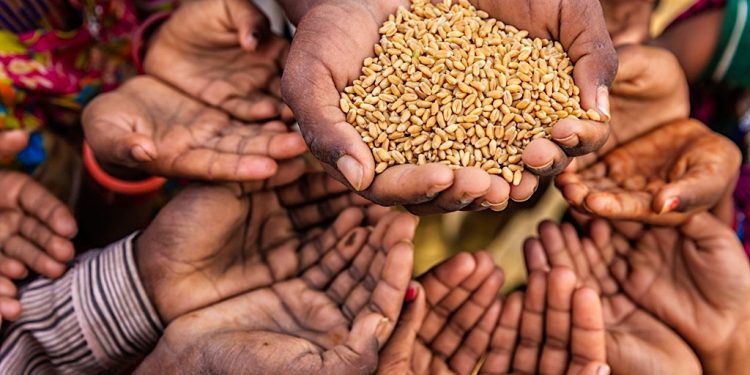Lesotho’s agricultural sector, the backbone of its economy and a crucial source of employment, has suffered significant setbacks due to recent extreme weather events.
Agriculture, contributing 60% to 70% of the country’s labour earnings, has been hit hard by the climatic onslaught, leading to severe impacts on the nation’s Agricultural Gross Domestic Product (GDP).
This was revealed in an exclusive interview by Economist and Private Sector Foundation of Lesotho Chief Executive Officer Thabo Qhesi who further noted that agriculture in Lesotho is predominantly small-scale, characterized by rain fed cereal production and extensive animal grazing.
In addition, the livestock subsector, notably twice as contributory as the crop subsector, along with rain fed crops like maize, wheat, sorghum, and various vegetables, forms the cornerstone of the nation’s economy.
“The Lowlands and Foothills, where most arable land is situated, house 75% 80% of the population dependent on agriculture,” he said.
The recent extreme weather, including floods, drought, frost, strong winds and heavy snowfall, are said to have wreaked havoc on Lesotho’s agro-ecological systems. These events have led to crop failures, unproductive rangelands and widespread food insecurity.
“The impacts extend beyond agriculture, affecting water resources, tourism, and health sectors,” he continued adding that damage to public and private infrastructure has necessitated costly repairs, road closures, limited access to electricity and complete failures of sewage and storm-water systems.
Consequently, the economic repercussions are substantial, with total losses and damages estimated at 3.2% of Lesotho’s GDP.
From his observation, Qhesi highlighted the ripple effects of climate change as having reduced agricultural productivity, exacerbated poverty and triggered rural-urban migration, unemployment and political instability.
“Local and regional food markets have felt the strain, with climate change-induced challenges causing food insecurity and malnutrition.”Food prices have soared compared to the previous year, undermining household purchasing power and further straining food security.
The fluctuating global food markets, in the context of climate change, have compounded the problem, making it increasingly difficult for households to secure adequate nutrition.
Despite efforts to bolster food security programs, Lesotho faces chronic challenges in this area. The country has struggled to address rural poverty and promote inclusive social development.
“Over a quarter of the population faces acute food insecurity, necessitating urgent humanitarian action to reduce food gaps, protect and restore livelihoods, and prevent malnutrition,” the CEO said.
Lesotho’s journey towards achieving zero hunger remains fraught with obstacles. The nation’s resilience is being tested as it navigates the dual challenges of extreme weather and climate change, underscoring the need for robust, adaptive strategies to safeguard its agricultural economy and ensure food security for its people.
Experts recommend a comprehensive review of the Agricultural Subsidy Policy to ensure it encompasses all agriculture sectors. Expanding the scope of subsidies can provide critical support to a broader range of agricultural activities.
Qhesi believes that revamping Self-Help Initiatives, known as Fato-Fato, should be refocused to emphasize agricultural activities, particularly food production. “By aligning community-driven efforts with agricultural objectives, this initiative can significantly contribute to enhancing food security.”
He also encourages Block Farming through Sustainable Agriculture Development Program (SADP) that can finance large-scale block farming initiatives with less stringent conditions. Easing the financial and administrative barriers for these projects can stimulate substantial agricultural production, benefiting food security.
According to Qhesi, ensuring that all agriculture-funded projects are supervised by independent professional consultants accountable to the government can enhance project efficacy.
This oversight is said to ensure that investments yield optimal results and contribute effectively to food security. Professional consultancy can provide technical expertise, monitor progress, and ensure transparency and accountability in the implementation of agricultural projects.
In addition to policy recommendations, he asserted that specific investments are crucial to improving food security in Lesotho.
“High-quality seedlings are fundamental to boosting crop yields and ensuring reliable food production.
Advanced irrigation equipment can mitigate the impact of erratic rainfall and droughts, ensuring a consistent water supply for crops,” he said, adding that these investments can enhance agricultural productivity and resilience to climate change.
Similarly, improving post-harvest handling facilities is crucial to reduce losses and maintain the quality of produce from farm to market.
“Adequate food storage facilities can help manage surplus production, ensuring food availability during lean periods and stabilizing market prices,” he said continuing to advise that these facilities can prevent post-harvest losses and extend the shelf life of agricultural products.
Developing robust farm fresh market infrastructure can enhance the distribution and accessibility of locally produced food, supporting both producers and consumers.
This infrastructure, according to the Economist, can provide farmers with better market access and consumers with fresh and nutritious food.
“Investments in greenhouses, tunnels, and nets can extend growing seasons, protect crops from adverse weather, and increase overall agricultural productivity.”
In response to these climate related challenges, the Ministry of Agriculture has announced a series of strategic policies and initiatives aimed at addressing the significant impacts of climate change on food security in Lesotho.
This was revealed in an exclusive interview by the Ministry’s Principal Secretary (PS) Moshe Masaase who outlined key policy measures, highlighting the government’s commitment to ensuring sustainable agriculture and food resilience amidst increasing climate challenges.
In May this year, according to the PS, the Cabinet approved a ground-breaking Irrigation Policy designed to mitigate the water shortages plaguing Lesotho’s agricultural sector.
This policy marks a significant step forward in providing farmers with reliable access to irrigation water, thereby enhancing their resilience against climate change.
“The Irrigation Policy addresses the critical issue of water scarcity for irrigation, enabling farmers to sustain and increase food production, which is vital for both household and national food security,” he said.
In response to rising food insecurity, Masaase explained that his Ministry is focusing on promoting intensive crop production. By encouraging the adoption of high-yield agricultural practices, the Ministry aims to boost local food production and ensure consistent access to nutritious food.
“Our strategy is to enhance crop production locally, which will help mitigate food shortages and ensure that food is accessible to all,” he added.
According to the PS, the Ministry has launched several initiatives to help farmers adapt to the changing climate. Key among these is the promotion of climate-smart agriculture and conservation agriculture.
These practices are said to be designed to conserve soil and moisture, making farming more sustainable and resilient to climatic variations.
Additionally, the Ministry has prioritized the construction of irrigation schemes in high-potential areas to maximize agricultural output.
Another significant development is the signing of the Millennium Challenge Corporation (MCC) II with a laser focus on Horticulture supporting farmers in adopting innovative and sustainable farming practices.
“This compact is expected to play a crucial role in enhancing the horticulture sector’s resilience to climate change,” he said.
“The Ministry is also channelling resources to improve farmer’s access to affordable, high-quality agricultural inputs. This support is aimed at boosting productivity and ensuring that farmers can maintain robust food production levels despite the challenges posed by climate change,” he continued.
Looking ahead, the Ministry is committed to improving the production of crops suited to Lesotho’s diverse agro-ecological zones. By focusing on crops adapted to local conditions, the Ministry believes it can sustainably increase crop yields and ensure long-term food security.
Collaboration with the Ministry of Local Government is said to be another critical aspect of this vision, Mosaase expanded that together, they are working to protect agricultural land from encroachment, ensuring that sufficient arable land remains available for future agricultural activities.
“Protecting our agricultural land is essential for maintaining high levels of crop production and ensuring food security for future generations,” he emphasized.
Coming into effect on March 30 this year, the government of Lesotho and the United States through the MCC II signed a M4.5 billion Lesotho Health and Horticulture Compact.
The initiative seeks to ensure greater access to quality healthcare, create equitable business development opportunities, invest in high-value crop production with horticulture taking the lion’s share of M2.1 billion.
The poject aims to increase rural incomes and fight food insecurity through investing in climate-smart irrigation infrastructure and attracting commercial farmers to collaborate with local, small-holder famers to produce high-value crops and build strong value chains.
It will also support government reforms and capacity to sustain inclusive and sustainable growth of this the horticulture sector.
Meanwhile, the Integrated Food Security Phase Classification’s July 2023 to March 2023 report found that at least 350 000 people in Lesotho face high acute food insecurity, the matter is classified as needing urgent intervention.






